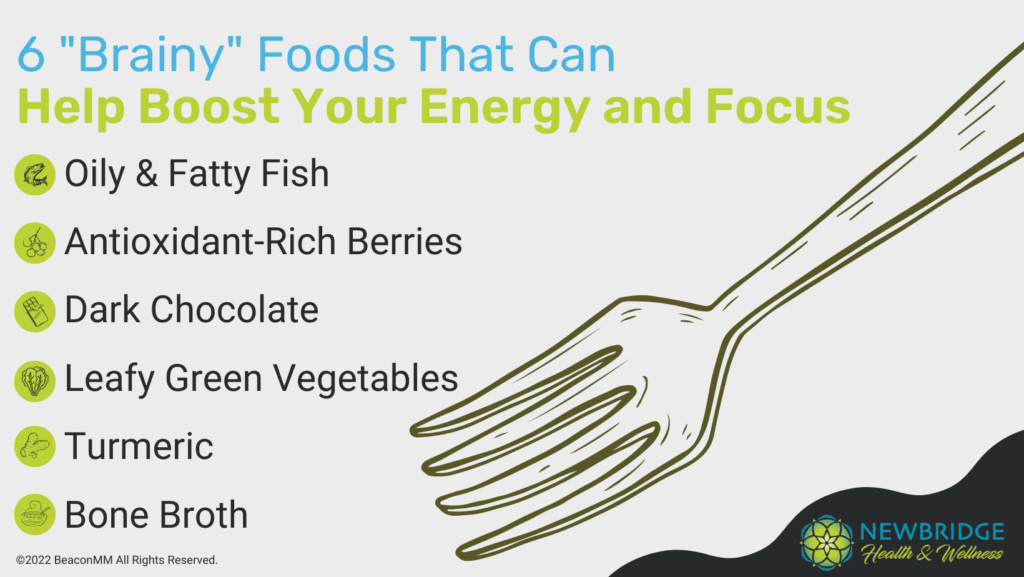While most of us are familiar with the phrase “you are what you eat,” the truth behind this statement goes much deeper than most people realize. It speaks to the physiological effects that the foods we choose to eat support or cause in our bodies. And if you’re eating foods that aren’t supporting your health, your health may begin to decline over time.
When it comes to brain health, the foods we eat are extremely important. Because when you take into consideration your own cognitive abilities; i.e., the ability to focus, concentrate, and problem-solve, eating foods that don’t support brain health can cause you to have trouble in these areas.
A balanced diet is key to better nutrition and unlocking optimal brain health. But what food is good for the brain? And what are the best foods for energy and focus? Here, we’ll explore several foods that support brain health and that may contribute to your overall health and wellness.
Would having more energy and focus make your life easier? Talk to a functional medicine practitioner at Newbridge Health and Wellness about a brain-boosting diet today.
What Does the Brain Need to Function Properly?

Believe it or not, the foods we eat can have a huge impact on both the health and structure of our brains. Certain foods and chemical compounds can actually change the structure of the brain, and some of the things we consume can kill brain cells in large quantities – such as alcohol and other substances.
The brain also requires an immense amount of energy to function properly – around 20 percent of the body’s calories. As such, the brain needs plenty of fuel in order for you to maintain energy, focus, and concentration throughout the day.
When it comes to nutrients, your brain needs plenty of protein, omega-3 fatty acids, and antioxidants to stay healthy, build and repair brain cells, and reduce stress and inflammation. And these nutrients are all found in the foods that we eat.
Oily & Fatty Fish
Oily fish are a great source of omega-3 fatty acids which help to protect brain cells. Omega-3s actually support the building of membranes around your body’s cells. And this can help to improve the structure of the brain.
High levels of omega-3s also can create improved blood flow in the brain which can result in greater cognitive abilities such as memory, focus, and concentration.
A few oily fish that are great for brain health include:
- Sardines
- Salmon
- Mackerel
- Herring
- Oysters
It should also be noted that oily and fatty fish are not the only sources of omega-3 fatty acids. You can also get this vital nutrient from seeds, nuts, and legumes.
Antioxidant-Rich Berries
Many berries contain flavonoid antioxidants which the brain actually loves. And this is because antioxidants help the body to reduce inflammation and oxidative stress. Additionally, antioxidant compounds can have other positive effects on your brain, and a few of these are:
- Improved synaptic function
- Reduced inflammation
- Improved memory
- Improved learning
- Reduced onset of neurodegenerative diseases
The antioxidants found in berries often include compounds such as quercetin, anthocyanin, caffeic acid, and catechin. And some of the best berries to consume for their antioxidant qualities are:
- Acai
- Strawberries
- Blackberries
- Blueberries
- Mulberries
- Blackcurrants
They also contain resveratrol – a non-flavonoid antioxidant also found in rhubarb that can offer preventative qualities such as cancer prevention, protection from inflammation, and from neurodegenerative conditions such as Alzheimer’s disease.
Dark Chocolate
Before your go run out to buy that giant bag of miniature Hershey bars, remember that not all chocolates are created equal. While chocolate is full of flavonoids, studies show that dark chocolate that contains at least 70 percent cocoa can potentially increase cognitive performance and cerebral blood flow.
In addition, dark chocolate is a great source of natural sugar that the body can easily convert to energy. And a few other benefits of dark chocolate include:
- Anti-inflammatory properties
- Cerebral blood oxygenation
- Lower blood pressure
- Lower oxidative stress in the brain and heart
While chocolate is great for satisfying your sweet tooth, remember that the darker the chocolate, the better it is for the brain and body.
Leafy Green Vegetables
Similar to berries, leafy greens can also help fight cognitive decline and prevent neurodegenerative conditions. And any meal that incorporates leafy greens can be a great energy source and keep you focused during the day due to its rich iron and folate content along with plentiful amounts of Vitamins A and K.
A few leafy greens that are great for energy and focus include:
- Kale
- Swiss chard
- Romaine lettuce
- Spinach
- Collards
Studies have also shown that leafy greens are rich in lutein, phylloquinone, and nitrates. Eating these greens regularly can improve overall body function and delay cognitive deterioration.
Turmeric
Turmeric is actually one of the most powerful anti-inflammatory agents found in nature. And this is largely due to curcumin – the chemical compound found in turmeric. This is probably why turmeric root has been part of ancient herbal remedies for thousands of years.
Turmeric also has numerous benefits such as:
- Boosting antioxidant levels
- Supporting immune system health
- Improving the brain’s oxygen intake
- Enhanced alertness
Turmeric is found in spice cabinets across the country. And consuming this in the form of teas, or as a flavoring agent to foods such as eggs, toast, or sprinkled on vegetables can be a great start to your day, boosting your energy, improving focus, and keeping you healthy.
Bone Broth
When it comes to healing the body from the inside out, bone broth can be a powerful source of healing amino acids such as proline and glycine along with high levels of collagen which can reduce intestinal inflammation.
A few benefits of consuming bone broth include:
- Boosting the immune system
- Improved memory
- Improving joint health
- Helping to heal a leaky gut
It’s often said that the gut is the body’s second brain due to the vast network of neurological connections within the gut. And consuming bone broth can actually help heal your gut – which can also help support brain health.
The Recipe for Boosting Your Brain
Nutrient-packed foods not only help the body to fight disease and protect brain cells, but can, can work to aid in memory, improve focus, and give you that boost of energy that you need throughout the day.
Additionally, diets composed of brain-boosting foods may also reduce the risk of Dementia, Alzheimer’s disease, depression, and other mental health issues. And while incorporating a few of the aforementioned foods in your diet can offer great benefits, consulting with a dietician or a functional medicine practitioner can help guide you toward building brain-healthy recipes that you (and your body) can enjoy each day.
Could you benefit from greater focus and energy with a brain-healthy diet? Reach out to Newbridge Health and Wellness and talk to a functional medicine expert today.


